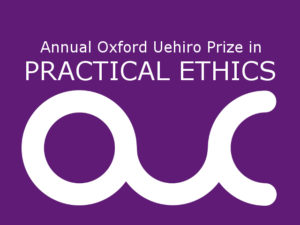Announcement: Finalists of the 9th Annual National Oxford Uehiro Prize in Practical Ethics and Final Presentation
We are pleased to announce the four finalists for the National Oxford Uehiro Prize in Practical Ethics 2023 and to invite you to attend the final where they will present their entries. Two finalists have been selected from each category to present their ideas to an audience and respond to a short Q&A as the final round in the competition.
The Presentation will be held on Tuesday 14th March from 5:30pm in the Lecture Room, Faculty of Philosophy, Radcliffe Observatory Quarter, Oxford OX2 6HT, followed by a drinks reception until 7:45 pm in the Colin Matthew Room.
All are welcome to attend the final and are warmly invited to join the finalists for a drinks reception after the event. Please sign up by the 12th March at: https://bookwhen.com/uehiro/e/ev-sqat-20230314173000
If you are unable to join the event in person, the presentation section will be presented as a hybrid zoom webinar. To register in advance for this webinar sign in here: https://us02web.zoom.us/webinar/register/WN_2FEbKuvyRCiu59Wa4soa0w
Please book now and support the next generation of Practical Ethicists.




